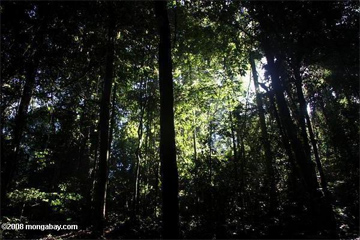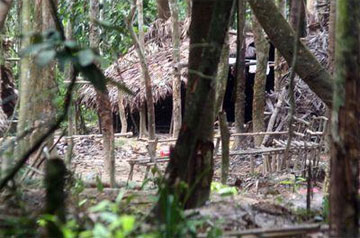Without safeguards, REDD could mimic logging concessions in Indonesia, a model fraught with corruption and conflicts over land, say indigenous rights’ groups.
|
|
In a letter released today, the United Nations Committee on the Elimination of Racial Discrimination expressed concern that a scheme to promote forest conservation in Indonesia via the Reduced Emissions from Deforestation and Forest Degradation (REDD) mechanism could increase conflict over land if the government doles out forest-carbon concessions in the same manner that it has with logging and plantation concessions. In the worst cases, forest people could be denied access rights to their traditional territories say indigenous rights’ groups.
“The Committee has received information according to which Indonesia continues to lack any effective legal means to recognize, secure and protect indigenous peoples’ rights to their lands, territories and resources. For instance, it seems that Indonesia’s 2008 ‘Regulation on Implementation Procedures for Reducing Emissions from Deforestation and Forest Degradation’ reiterates Law 41 of 1999 on Forestry that appears to deny any proprietary rights to indigenous peoples in forests,” wrote Fatimata-Binta Victoire Dah, Chairperson of the Committee for the Elimination of Racial Discrimination (UNCERD).
The letter urges the Indonesian government to “review its laws … as well as the way they are interpreted and implemented in practice, to ensure that they respect the rights of indigenous peoples to possess, develop, control and use their communal lands.”
  Indonesia already has more than 20 REDD projects in development, most of which are in Kalimantan, Papua, and Sumatra. The top picture shows old-growth forest in Borneo, the lower shows an indigenous settlement. |
Earlier this month Indonesia applied to join the World Bank’s Forest Carbon Partnership Facility, a $350 million fund for jump-starting REDD projects in developing countries. To date Indonesia is the largest country to apply to the program, which seeks to reduce greenhouse gas emissions by protecting tropical forests. Although REDD could eventually send billions of dollars to tropical nations for forest conservation and sustainable development activities, critics say the mechanism could be hijacked by industry interests seeking compensation for establishing large-scale plantations on forest lands or abandoning unprofitable concessions that would otherwise not have been developed. There are also fears that corruption will impede fair distribution of funds to local people especially in places where the rights of forest people are not recognized.
“Since the rights of indigenous peoples is an important national issue, not just as it relates to forests, it requires good will and strong efforts by the various government institutions to work together to implement these rights,” said Abdon Nababan, Secretary General of Aliansi Masyarakat Adat Nusantara (AMAN), Indonesia’s national indigenous peoples’ organization. AMAN is calling for greater transparency, accountability, and involvement of indigenous people in the REDD development process.
The UNCERD letter also criticized Indonesia for failing to respect indigenous peoples’ rights in relation to oil palm plantations. It highlighted threats posed to indigenous territories by the Kalimantan Border Oil Palm Megaproject, a massive oil palm project planned in the heart of Borneo near the Indonesia-Malaysia border.
Related articles
Communities must benefit for forest carbon schemes to be effective
(12/13/2007)
Much has been promised by what avoided deforestation carbon credits can do to support forest protection, increase tax revenues, and develop sustainable rural economies in our Zamrud Khatulistiwa or Emerald on the Equator. In the wake up of the COP 13 meeting in Bali, the focus of media attention has been on how much money rainforest countries can receive for protecting their forests. Yet, what we see as a potentially more important issue — and an issue that hasn’t received much attention — is how AD projects will be implemented locally to maximize benefits. What the market tells us, is that a better implemented AD project receives more funding, so what we hope to discuss here is how to implement, successfully, AD at the regency level in a transparent, effective, and sustainable manner so that the benefits are properly distributed to rural communities while protecting our environment.
Carbon conservation schemes will fail without forest people
(10/16/2008)
Mechanisms that use forest conservation to reduce greenhouse gas emissions are doomed to fail unless they are “based on respect for the rights of indigenous peoples and forest communities,” warn environmentalists and indigenous rights groups meeting in Oslo this week. Indigenous groups fear they are being excluded from discussions on Reduced Emissions from Deforestation and Forest Degradation (REDD), a proposed financial mechanism that would compensate tropical countries for reducing emissions caused by deforestation and land use. Such emissions account for a fifth of the global total, or more than the total emissions from transportation. In particular, indigenous groups and forest communities are concerned they will not see benefits from REDD. Worse, some believe the mechanism could trigger a new wave of land grabs and evictions by parties seeking to capitalize on carbon payments. Indigenous groups and forest communities have long struggled against development interests seeking to exploit their traditional lands and resources. But supporters of so-called “avoided deforestation” schemes say that properly-designed policy offers unprecedented opportunities to create sustainable livelihoods for forest people while safeguarding biodiversity and services provided by healthy forest ecosystems.
Deal on forests falls short
(12/11/2008)
A deal reached Wednesday in Poznan to include forests in future climate treaties is a positive step but falls short of the progress needed to get the REDD (reducing emissions from deforestation and degradation) mechanism on track for incorporation into the framework that will succeed the Kyoto Protocol, say environmentalists speaking from the talks.